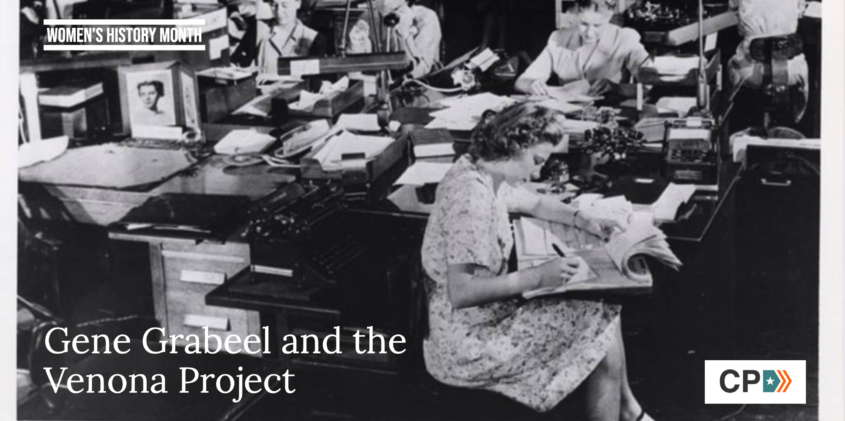Women’s History Month: Gene Grabeel and the Venona Project
Sometimes multiple areas of interest collide into one topic, making my research easy and fun. Such is the case here with Gene Grabeel and Women’s History Month.
Given world events at this moment and the fact that a great deal of my education has to do with 20th Century European history, I’ve spent significant time revisiting Cold War developments. So, imagine my surprise when I discovered that it’s Women’s History Month and that there is a connection between this month and the Cold War.
A little-discussed operation until recently, the Venona Project began before WWII’s end and picked up full-steam as the Iron Curtain descended across Europe. Many military leaders saw the writing on the wall, so to speak, regarding US-Soviet relations and began taking steps to address their distrust of Joseph Stalin with intel-gathering projects like Venona.
One of those leaders was Colonel Carter W. Clarke. Clarke ordered mathematician and cryptanalyst Gene Grabeel to create the Venona Project. This project was kept classified until 1995, after which time many secrets about the Soviet’s influence in the West came to light. Grabeel was a fundamental part of the Venona Projects and the information it discovered.
Following college, Grabeel worked as a home economics teacher for teenage girls, which she found rather less than satisfying. In December of 1942, despite the incredibly vague job description, she took a job with the Signal Intelligence Service. Her initial duty was to decode Soviet ciphertext, and in less than two months, she founded the Venona Project under Colonel Clarke.
This was the start of Grabeel’s 36-year career with the Signal Intelligence Service, and the incredible legacy she created. Grabeel and her cryptanalyst team deciphered codes that lead to the discovery of Soviet spies in the Manhattan Project, top government officials who were passing information, and great insight into the Soviet Union’s general intent and operations.
Through a “brute force” approach using IBM punch card machines and good ol’ fashioned mathematical-influenced analysis, Grabeel and her colleagues made a significant discovery:
…the former home ec teacher and her colleagues divined that Arlington Hall had messages passing along five different Soviet communications systems. One, the most voluminous, had to do with trade—often about materials being sent from the U.S. to Russia through the Lend-Lease program. Another carried regular diplomatic communications. In time, the code breakers discerned that the other three were spy systems: GRU, or military intelligence; naval intelligence; and the NKVD, the forerunner of the KGB.
The real breakthrough came shortly after when Grabeel and others discovered that some Soviet spies involved in espionage operations had repeatedly used their encryption keys. While not quite equivalent to leaving your password to a secure facility up for a national television audience to see, it was a definite blunder in spycraft. It allowed the American intelligence analysts to make a significant crack in the code.
The importance of this discovery cannot be overstated. Had it been a one-time code-break that resulted in something like the Rosenbergs being caught, that would be significant in itself.
The Venona Project continued on in almost complete secrecy for more than three decades and led to many leaps forward in understanding Soviet operations.
Because of their work, we learned more about how the Soviets advanced their nuclear program. More than could have ever been learned via spying. The dedication of Grabeel and co-workers Angeline Nanni, Mary Jo Dunning, and others who worked on the project allowed for breakthroughs that have impacted everything from modern computers to ongoing geopolitical situations.
In 1995, Grabeel was recognized by the CIA as an “American Hero.” After passing away in 2015, she was memorialized by a highway marker in Virginia. While that seems vastly inadequate recognition for her contributions to the world of computing and espionage, it’s in a way quite fitting for someone who was described as quiet and unassuming.
So, this Women’s History Month, we pay homage to the hard work of Gene Grabeel and her associates. Their contributions to both the coding and international security worlds are worthy of high praise.
Subscribe To Our Newsletter
Join our mailing list to receive the latest news and updates from our team.
Thank you for subscribing to our email list!

